Do you have a question about the Panasonic DMR-EH69 and is the answer not in the manual?
Details the region number for DVD playback in Asia, specific to this unit.
Details the region number for DVD playback in New Zealand, specific to this unit.
Details the region number for DVD playback in the Middle East, specific to this unit.
Covers safe usage of laser products and warns against opening covers or self-repair.
Details precautions to reduce fire and electric shock risks, including avoiding moisture and using correct accessories.
Provides critical safety information for the AC mains lead, including fuse replacement and plug suitability.
Offers guidance on battery disposal and product disposal information for outside the EU.
Lists and identifies all accessories supplied with the DVD recorder unit for user verification.
Details proper battery usage, handling precautions, and remote control signal sensor location.
Provides guidance on handling the HDD to prevent damage and outlines essential setup precautions.
Offers instructions on cleaning the unit's exterior and lens, plus handling precautions during operation.
Explains the function of each button on the remote control for operating the unit's features.
Details the meaning of various indicators and symbols displayed on the unit's front panel.
Identifies the primary components and connection terminals on the main unit.
Explains how to access and use the FUNCTION MENU for quick selection of unit functions.
Provides instructions for connecting the unit to a TV using aerial, RF coaxial, audio/video, and other cables.
Details the process of connecting the unit to a TV using a 21-pin Scart cable, including RGB output considerations.
Explains the advantages of HDMI for high-quality video/audio and notes requirements for cables and HDTVs.
Describes linked operations between the unit and Panasonic TVs/receivers via HDMI for synchronized control.
Guides through initial TV setup, downloading tuning positions, and configuring power save settings.
Explains how to select the correct TV aspect ratio (16:9, Pan & Scan, Letterbox) for optimal viewing.
Details which types of discs (HDD, DVD-RAM, DVD-R, etc.) are compatible for recording and playback.
Explains the different recording formats supported, including DVD Video Recording and +VR formats.
Lists disc types that can only be played on this unit and cannot be recorded on.
Identifies specific disc types, formats, and region codes that are not supported by this unit.
Explains how to match the unit's TV system setting with disc or HDD title formats (PAL/NTSC) for correct playback.
Specifies the types of USB memories and digital cameras compatible with the unit's USB port.
Details the SD and SDHC memory cards supported, including formats, file structures, and capacity limits.
Details file format requirements, playable media, and folder/file limitations for DivX, WMA/MP3, and JPEG files.
Explains how to structure folders for optimal playback of WMA/MP3 and JPEG files.
Provides step-by-step instructions for inserting and removing discs, USB memory, and SD cards safely.
Offers advice on handling discs and cards to prevent scratches, dirt, and damage for optimal performance.
Explains how to select and play video titles recorded on HDD or DVD, including menu operations.
Details how to play various disc types like DVD-V, VCD, and CD, including menu operations.
Guides on starting recordings, pausing, stopping, and specifying recording times using the REC button.
Lists available recording modes (XP, SP, LP, EP) and explains how to specify a recording stop time.
Explains how to use G-CODE numbers for easy timer recording of programmes from TV listings.
Guides on manually programming timer recordings, including setting times, dates, and channels.
Covers cancelling timer recordings and releasing the unit from recording standby.
Provides step-by-step instructions for deleting titles using the DELETE Navigator interface.
Explains how to delete titles while a programme is currently playing.
Illustrates how deleting titles affects available recording space on different disc types.
Explains how to record main or secondary audio for bilingual broadcasts.
Details how the unit records programmes based on aspect ratio settings and external equipment inputs.
Provides notes on high-speed copying and limitations for recording 'one time only' broadcasts.
Presents a table detailing recording modes (XP, SP, LP, EP) and their approximate recording times on various media.
Explains the Flexible Recording mode for fitting recordings within remaining disc space for optimal quality.
Covers formatting new discs and finalising recorded discs for playback compatibility on other equipment.
Details situations where Flexible Recording is convenient for fitting content to disc space or copying to fit a 4.7 GB disc.
Explains how to play titles while recording, including chasing playback and simultaneous play options.
Guides on using DV Auto Rec for automatic chapter creation and playlist generation from DV equipment.
Provides instructions for manual recording from external video equipment, including input selection and noise reduction.
Details how to manually program timer recordings, including setting times, dates, channels, and programme names.
Covers cancelling recordings in progress, releasing the unit from standby, and notes on timer recording activation.
Explains how to check, change, or delete programmes from the timer recording list using icons and messages.
Describes Relief Recording (switching to HDD) and Auto Renewal Recording (overwriting old programmes) functions.
Covers basic playback controls like Stop, Pause, Search, Skip, and Starting from a Selected Title.
Explains how to skip forward or backward by a specified time, manually skip, and create chapters.
Details how to change audio channels or soundtracks during playback for different types of discs.
Guides on how to access the DIRECT NAVIGATOR screen to view and select recorded titles for playback.
Explains how to sort titles for searching, group titles, edit group names, and switch NAVIGATOR appearance.
Instructions for showing the DivX menu screen and playing DivX video files from discs or USB.
Details how to select different file types (DivX, Picture, Music) for playback from discs or USB/SD.
Explains how to use the tree screen to navigate and find specific folders containing media files.
Covers registration requirements for DivX VOD and content playback limitations like rental expiry.
Explains how to play WMA/MP3 files from CDs, USB memory, or HDD, and find groups/tracks.
Details how to display the Album View screen, select albums, and navigate through still pictures.
Explains how to navigate through still pictures, view their properties, and return to previous screens.
Guides on starting slideshows, adding music, adjusting intervals, and setting repeat play options.
Explains how to rotate pictures and zoom in/out, noting that these changes are not stored.
Instructions for playing music CDs, including Gracenote® database search and track selection.
Details how to play music tracks recorded on the HDD, including selecting albums and tracks.
Covers functions during music playback like Stop, Pause, Search, Skip, Repeat Play, Sort, and Properties.
Explains how to access and use the FUNCTION MENU for quick selection of unit functions.
Guides on how to pause a TV programme and resume it later by saving it temporarily on the HDD.
Defines VIERA Link "HDAVI Control" and its benefits for synchronized control with TVs and receivers.
Provides preparation steps and outlines features like easy playback, power links, and direct TV recording.
Explains how to operate the unit using TV remote buttons via HDMI for FUNCTION MENU and OPTION menus.
Describes how to use the Control Panel functions (pause, search, stop) via the TV remote control.
Guides on how to edit titles, divide titles, and manage chapters for recorded programmes.
Explains using DIRECT NAVIGATOR to select titles for editing, viewing other pages, or managing chapters.
Details how to create, release, and manage groups of titles for better organization and selection.
Covers deleting titles, changing properties, naming, protecting, and partial deletion of titles.
Explains how to change thumbnail images and divide titles into multiple parts for better organization.
Details operations for deleting, creating, and combining chapters within titles.
Guides on how to create playlists by arranging chapters and adding them to a playlist.
Covers editing, copying, naming, and managing chapters within playlists for organized playback.
Details how to edit, copy, name, and manage playlists and their associated chapters.
Explains adding, moving, creating, combining, and deleting chapters within playlists.
Covers editing albums, adding pictures, creating albums, and managing individual pictures.
Explains how to copy still pictures from discs or memory cards to HDD or DVD.
Guides on editing music albums and tracks, including deleting, renaming, and setting properties.
Explains how to delete still pictures and music files efficiently using the DELETE Navigator.
Details the character limits and methods for entering text for titles, playlists, albums, and tracks.
Provides instructions on navigating the name entry screen and using numbered buttons to input characters.
Outlines copy directions, high speed mode, finalization, and media compatibility for copying titles and playlists.
Details copying SD video files from SD cards or video equipment to HDD or DVD-RAM.
Provides a table of approximate copying times for various modes and disc types.
Covers prerequisites for copying, including audio selection, speed modes, and finalization.
Provides step-by-step instructions for copying video titles from HDD to DVD-R discs using the unit.
Explains how to use the COPY Navigator to select titles, view properties, and sort them for copying.
Guides on creating a copy list by selecting titles/playlists and setting copy direction, mode, and destination.
Details how to start, stop, and manage the copying process, including high-speed and normal speed options.
Explains the icons and functions within the COPY Navigator for managing copying lists and data.
Covers how to edit, delete, or cancel registered copying settings and lists.
Provides instructions for copying content from finalised DVD-R, DVD-R DL, etc., discs to the HDD.
Explains how to set a specific time for copying disc content to the HDD.
Guides on copying SD video from DV camcorders or other video equipment to HDD or DVD-RAM.
Details how to copy SD video files from an SD card to HDD or DVD-RAM.
Explains how to use the copying list to register and copy still pictures and folders.
Provides steps for registering individual still pictures or folders, and editing the copying list.
Guides on copying all still pictures from USB memory to HDD, utilizing the copying list.
Explains how to copy only new still pictures from an SD card to HDD using the copying list.
Details copying music from CDs to HDD, utilizing Gracenote® Database for title information.
Explains copying MP3 or WMA files from USB memory, CD-R, etc., to the HDD.
Guides on registering individual WMA/MP3 files or folders for copying to the HDD.
Instructions on downloading Gracenote® database updates and updating the unit's internal database.
Outlines common steps for navigating on-screen menus to access and change settings.
Details settings within the Disc menu for soundtrack, subtitle, angle, audio channel, and DivX source selection.
Covers functions for changing playback sequence like Repeat Play, and picture quality adjustments.
Details status messages displayed on the unit, including drive status, recording information, and Pause Live TV.
Outlines common steps for accessing management menus like HDD, DVD, or Card Management.
Explains how to set protection for discs, manage cartridge-protection, and provide names for discs.
Provides steps to delete all titles and playlists, noting potential data loss.
Guides on formatting HDD, discs, and cards, emphasizing that this action deletes all contents.
Explains how to select the background style for the DVD-Video top menu after finalising or creating a top menu.
Details choosing whether to show the Top Menu first or play directly, and finalising discs for compatibility.
Guides on creating a Top Menu for +RW discs for easier playback and organization.
Outlines the general steps to access and change various unit settings via the Setup menu.
Explains manual channel tuning, adding/deleting programmes, and managing programme positions.
Provides guidance on best tuning conditions and selecting video system and audio reception types.
Covers settings for ratings, soundtrack, subtitle, and menus for DVD-Video playback.
Details settings for recording time, aspect ratio, chapter creation, and high-speed copy.
Explains picture settings like Comb Filter, Still Mode, and Seamless Play for optimizing image quality.
Covers sound settings including Dynamic Range Compression, Bilingual Audio Selection, and Digital Audio Output.
Explains display settings such as On-Screen Messages, FL Display, and Pause Live TV Icon.
Details settings for screen saver activation and controlling the FUNCTION MENU display.
Covers TV Aspect, Progressive output, and TV System settings for optimal connection.
Explains HDMI Video Format, Aspect for 4:3 Video, Digital Audio Output, VIERA Link, AV1, and AV2 input settings.
Explains how to change the remote control code to match the main unit for operating other Panasonic products.
Guides on setting the clock and configuring auto standby and power save options.
Covers DivX registration for VOD content and unit initialization procedures like shipping condition and default settings.
Details how to configure the remote control to operate TV functions like power, input, channel, and volume.
Explains how to activate and deactivate the Child Lock feature to prevent unauthorized operation.
Provides instructions for connecting the unit to a TV using S-Video terminals for improved picture quality.
Details connecting the unit to a TV via Component Video terminals for progressive output and purer picture.
Guides on connecting the unit to amplifiers with digital input terminals or stereo amplifiers.
Explains connecting to HDMI-compatible TVs and receivers for high-quality digital audio and video.
Provides instructions for connecting the unit to a TV and VCR using AV terminals and Scart cables.
Answers common questions regarding equipment, connections, and television compatibility.
Addresses queries about playing DVD-Video and CDs from different regions or without region numbers.
Answers questions about recording from external sources, digital audio signals, and bilingual broadcasts.
Clarifies what can and cannot be done using the unit's USB port for file transfer and device compatibility.
Addresses questions about recording the same CD multiple times and transferring music tracks.
Provides lists of TV reception channels based on tuner systems for different regions.
Lists common error messages displayed on the unit or TV and their potential causes.
Provides a list of language codes to be entered for various languages.
Explains messages related to DVD operations, errors, read issues, and write protection.
Lists various error codes (F74, F75, U59, U61 etc.) and their meanings, often indicating malfunctions.
Addresses issues with the unit not powering on, dim displays, and incorrect time displays.
Discusses problems with TV reception, status messages, grey background, and incorrect picture aspect ratios.
Addresses issues like after-image, distorted pictures, no picture, and incorrect aspect ratios.
Covers sound issues and problems where the unit or remote control doesn't work.
Addresses slow startup, recording failures, timer recording issues, and copying problems.
Covers problems with high-speed copying, DV automatic recording, loud sounds, and playback failures.
Addresses issues like momentary pauses, DVD-Video not playing, soundtrack/subtitle selection, and editing problems.
Covers problems with disc space after deleting, editing, formatting, and copying music tracks.
Addresses problems with displaying still pictures, card/USB memory readability, and copying operations.
Covers VIERA Link not working, operation interruptions, and procedures for resetting the unit.
Provides guidelines for safe placement, voltage sources, and precautions for the AC mains lead.
Details safety measures for foreign matter, service recommendations, and Gracenote technology information.
Lists recording systems, recordable discs, and their respective speed specifications.
Details video output formats, television systems, and channel coverage for different regions.
Specifies SD card compatibility, formats, file types, and USB port capabilities.
Lists region codes, operating temperature, humidity, power supply, dimensions, and mass of the unit.
Defines technical terms related to audio, video, recording, and file formats used in the manual.
Explains image-related terms like Thumbnail, WMA compression format.
Defines high definition video standards including interlaced and progressive formats.
| Brand | Panasonic |
|---|---|
| Model | DMR-EH69 |
| Category | DVD Recorder |
| Language | English |
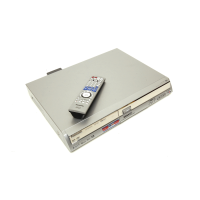
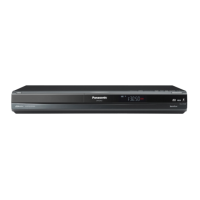
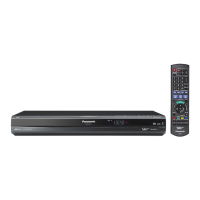
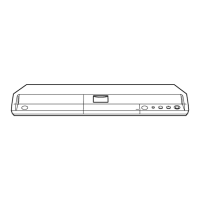
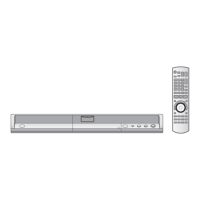

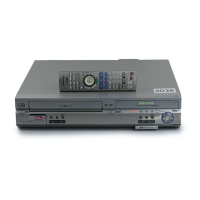
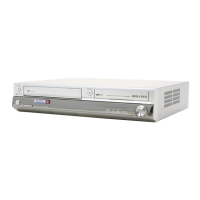

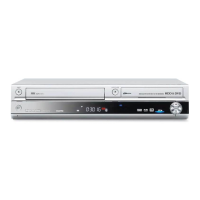
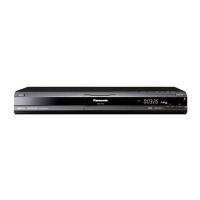

